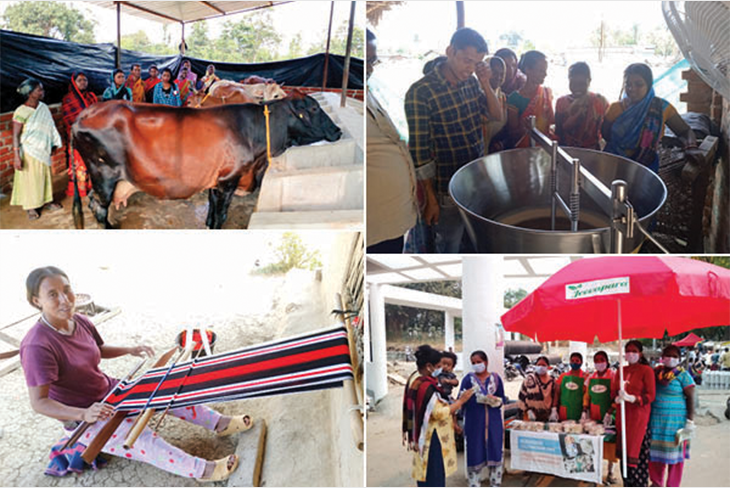Women dairy farmers in Jitpur village in Madhupur block of Deoghar district in Jharkhand recently learned to turn their unsold milk into condensed milk and cheese to avoid waste and loss. This training is just an episode in an ongoing story of how ActionAid Association is strengthening women’s livelihoods across Jharkhand, Assam, Nagaland, Manipur and Karnataka.
Home to nearly 40 households, Jitpur village in Madhupur block of Deoghar, Jharkhand, witnesses continued water scarcity coupled with small landholdings. Lack of water compels communities dependent on agriculture to undertake seasonal migration for livelihood. Following the COVID-19 pandemic, ActionAid Association facilitated various training sessions for women farmers and provided them with vegetable seeds to promote sustainable agriculture in the village. While engaging with them, we got first-hand insights into the vital role played by women in animal husbandry. As a result, we identified dairy farming as a sustainable source of livelihood in addition to agriculture.
Subsequently, in August 2021, we began an intervention to support a group of 10 women from the village for dairy farming. The Gram Pradhan provided an acre of land for the same. We segmented a piece of land for dairy farming, organic farming, duck-raising, and an organic compost production unit through a participatory process. We constructed a shed for cows to facilitate the dairy farm, then purchased ten cows and hired a milkman to help the women engaged in the initiative for a month. We also supported the dairy farm with a chaff cutter to prepare fodder for cows and a 160-feet-deep tube borewell with a motor to ensure a smooth water supply. Today, an average of 65 litres of milk is produced every day by the women’s collective. The farm delivers to 25 customers, including sweet shops, at around Rs. 44 per litre. An automatic milking machine has now been provided to the dairy farm to reduce drudgery.
The recent training and support for the purchase of equipment for processing milk is helping save the unsold milk from waste and adds to income. Along with dairy farming, we promote the preparation of organic compost, insecticides and pesticides at the farm. Women are also learning how to process cow dung as green manure for sustainable, organic farming. In addition, a pond has been constructed at the farm to promote duckery and fishery.
In three states of North-East India, namely Assam, Nagaland and Manipur, we supported vulnerable women across nine districts for livelihood regeneration. While doing so, we planned to build upon the existing skills of community women and the trades they were interested in, which also had the potential of enhancing economic opportunities locally with access to viable markets. Therefore, through a consultative process, we focused on agriculture, horticulture, spice production, and agro-based allied activities. Thus activities such as mushroom cultivation, vermicomposting and food processing are promoted in addition to weaving, tailoring and crafts.
We also supported marginalised women in material inputs and technical handholding. We facilitated the collectivisation of women and the formation of village-level producers’ groups, thereby enabling these women to generate additional income for their families. To assist women in agriculture and agro-based activities, we distributed seeds, saplings and organic composts. In addition, we facilitated the use of tractors in ploughing fields, the revival of traditional irrigation mechanisms, transportation, storage and packaging. To support women in weaving, tailoring and other such activities, we distributed yarn, clothes and sewing machines.
Besides, we conducted skill-building for these women to help them calculate the cost of their products and to develop product catalogues. We also organised a sales-cum-exhibition in addition to several buyer-seller meetings to promote their products and build market linkages. Our livelihood regeneration initiatives have directly supported nearly 1,300 vulnerable women and their families.
In Bengaluru, Karnataka, we are equipping women with mushroom farming skills to enable them to earn a living. After setting up a dedicated space for the same near Satellite Bus Station in the city, we supported these women with 850 Ready-To-Fruit (RTF) bags. We also provided them with a structure to hang the bags, gloves, disinfectants, sanitiser and disposable chef caps. Besides, together with the Indian Council of Agricultural Research and the Indian Institute of Horticultural Research (ICAR-IIHR), Hessaraghatta, Bengaluru, we facilitated theoretical and hands-on training for these women.
The space at the centre can at a time accommodate around 300 bags on hanging ropes from which 100-125 kilograms of mushroom can be harvested in 25-30 days, environmental conditions permitting. We are also supporting this women’s collective in marketing their produce. The women have set up stalls in public places to sell their produce. Overall, between September 26, 2021, to March 31, 2022, this women’s collective has sold nearly 127 kilograms of oyster mushrooms, enabling a collective earning of almost Rs. 38,000.

